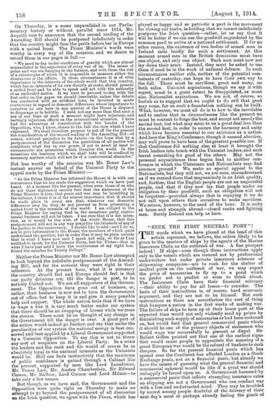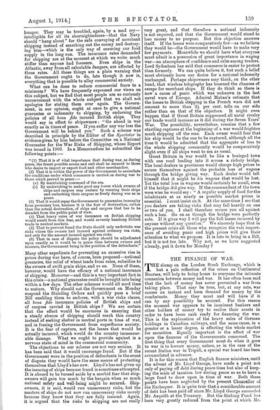" SEEK THE FIRST NEUTRAL PORT " ! T HE words
which we have placed at the head of this article represent, we believe, the orders likely to be given to the masters of ships by the agents of the Marine Insurance Clubs on the outbreak of war. A fine prospect indeed ! If ships—even though these instructions apply only to the vessels which are insured not by professional underwriters but under private insurance schemes of shipowning companies—are to rush for the shelter of neutral ports on the outbreak of war, we may expect the price of necessaries to fly up to a point which we prefer not to predict or even to think about. The Insurance Clubs have their financial solvency —their ability to pay for all losses—to consider. The basis of their instructions is, of course, hard economic argument, and they are not to be blamed. But such instructions as these are nevertheless the sort of thing that hampers a nation in the first weeks of making war. The failure of ships to turn up at their home port at the expected time would not only violently send up prices by diminishing such supply of necessaries as had been reckoned on, but would feed that general commercial panic which it should be one of the primary objects of statesmen who would wage war successfully to prevent or dispel. Sir Robert Giffen pointed out that one of the earliest signs that would cause people to appreciate the meaning of a, great European war would be the refusal of bankers to cash cheques. So far the present financial panic which has spread over the Continent has affected London as a Stock Exchange panic, not as a financial panic, but already we have the means of guessing what the general financial and commercial upheaval would be like if a great war should unhappily be forced upon us. A Government harassed by a commercial panic that inflicts strangling insurance rates on shipping are not a Government who can conduct war with a free and undistracted mind. They may be troubled by unrest among people doubtful of the delivery of their next day's meal or perhaps already feeling the pinch of hunger. They may be troubled, again, by a mad cry— intelligible for all its shortsightedness—that the Navy should "bang about" for the safe convoying of merchant shipping instead of searching out the enemy and destroy- ing him—which is the only way of ensuring our food supply in the long run. The insurance rates demanded for shipping are at the moment at which we write much stiffer than anyone had foreseen. Even ships in the Atlantic, away from all calculable dangers, are affected by these rates. All these things are a plain warning that the Government ought to do, late though it now is, everything that is possible to allay commercial anxiety. What can be done to reduce commercial fears to a minimum ? We have frequently expressed our views on this subject, but we find that most people are so curiously unconversant with the whole subject that we shall not apologize for stating them over again. The Govern- ment, in our opinion, ought at once to give a national guarantee or indemnity to shipping, by endorsing the policies of all bona fide insured British ships. They would say in effect to shipowners : " Go ahead in war exactly as in times of peace. If you suffer any war loss the Government will be behind you." Such a scheme was described in principle by the Editor of the Spectator in evidence given by him before the Committee on a National Guarantee for the War Risks of Shipping, whose Report was issued in 1908. In a Memorandum he submitted the following points :- " (1) That it is of vital importance that during war, as during peace, the freest possible access and exit shall be secured to those who desire to import or export food and other merchandise.
(2) That it is within the power of the Government to assimilate the conditions under which commerce is carried on during war to those which prevail in peace :- (a) By maintaining command of the sea.
(b) By undertaking to make good any losses which owners of ships and cargoes may sustain by running their ships and embarking their cargoes as freely during war as in peace.
(3) That it would repay the Government to guarantee immunity from pecuniary loss, because it is the fear of destruction, rather than the actual destruction, of ships and cargoes that has to be dreaded from the public point of view. (4) That heavy rates of war insurance on British shipping would result from this fear, and would severely handicap British trade in neutral markets.
(5) That to prevent fraud the State should only undertake war risks where the owners had insured against ordinary sea risks, and only for the amount insured against sea risks.
(6) That in case of dispute the policy should be adjudicated upon exactly as it would be in peace time between owners and insurers, the Government being in the position of the defendants."
Many other expedients for preventing an excessive rise in prices during war have, of course, been proposed—national granaries, the relief of wheat lands from rates, subsidies to the owners of swift grain ships, and so on. None of these, however, would have the efficacy of a national insurance of shipping. Moreover—and this is a very important fact in this crisis—a national guarantee could be brought into being within a few days. The other schemes would all need time to mature. Why should not the Government on Monday suspend the Standing Orders and quickly pass a brief Bill enabling them to endorse, with a war risks clause, all bona fide insurance policies of British ships and of cargoes carried in British ships P We are certain that the effect would be enormous in ensuring that a steady stream of shipping should reach this country instead of seeking shelter in neutral ports in time of war, and in freeing the Government from superfluous anxiety. It is the fear of capture, not the losses that would be actually incurred, which would do the country immeasur- able damage. What we ought to provide against is a nervous state of mind in the commercial community.
The objections to our scheme are not very serious. It has been said that it would encourage fraud. But if the Government were in the position of defendants in the event of dispute they would have the same weans of protecting themselves that Lloyd's has now. Lloyd's has not given up the insuring of ships because fraud is sometimes attempted. It is absurd to be turned aside by a morbid fear that ship- owners will gain too much by the bargain when so much national safety and well-being might be secured. Ship- owners, it is said, would run unnecessary risks, but the masters of ships do not now run unnecessary risks merely because they know that they are fully insured. Again, it is argued that the risks to shipping are not really very great, and that therefore a national indemnity is not required, and that the Government would stand to lose money to no purpose. But this objection answers itself. If the losses were comparatively few—as we believe they would be—the Government would have to make very few payments. Meanwhile we should have what everyone must admit is a possession of great importance in waging war—an atmosphere of confidence and calm among traders. Lord Sydenham has said that commerce is easier to protect than formerly. We can quite believe it, but such a belief must obviously leave our desire for a national indemnity unchanged. Perhaps shipowners may think, on the other hand, that wireless telegraphy has lessened the chances of escape for merchant ships. If they do think so there is now a cause of panic which was unknown in the last naval wars of Europe. Admiral Mahan's estimate that the losses to British shipping in the French wars did not amount to more than per cent. tells on our side rather than on that of the objectors. It might even happen that if Great Britain suppressed all naval rivalry our trade would increase as it did during the Seven Years' War. The possibility, nevertheless, remains that a few startling captures at the beginning of a war would frighten much shipping off the seas. Each owner would fear that his ship would be the one to be captured, although all the time it would be admitted that the aggregate of loss to the whole shipping community would be comparatively slight even if all ships went to sea as usual.
Great Britain in war would be like a besieged town with one road leading into it across a rickety bridge. The local dealers in provisions would charge high prices to secure themselves against the probable loss of wagons through the bridge giving way. Each dealer would tell himself that it might be Isis wagons that would be lost. Yet the total loss in wagons would certainly be small, even if the bridge did give way. If the commandant of the town were wise he would say : " A regular supply of food for the inhabitants at as nearly as possible market prices is essential. I must insist on it. At the same time I see that you dealers are taking risks that may fall heavily on one or two of you. I shall therefore secure you all against such a loss. Go on as though the bridge were perfectly safe. If it gives way I will pay the full losses incurred by anyone without any question." We sincerely hope that in the present crisis all those who recognize the vast import- ance of avoiding panic and high prices will give their attention to what we propose. It is late to bring in a Bill, but it is not too late. Why not, as we have suggested already, put it down for Monday ?



































 Previous page
Previous page